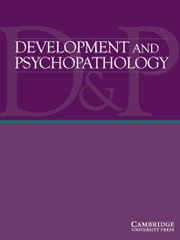Introducing the new Co-Editors-in-Chief of Development and Psychopathology
In 1989, Dr. Dante Cicchetti founded Development and Psychopathology, a journal that quickly came to reflect the best scholarship in the then nascent field of developmental psychopathology. In the context of Dr. Cicchetti’s transition to Founding Editor Emeritus of the journal, Cambridge University Press is very pleased to announce the appointment of Dr. Ben Hankin and Dr. Glenn I. Roisman as Co-Editors-in-Chief of Development and Psychopathology.

Dr. Hankin is the Fred and Ruby Kanfer Professor of Psychology at the University of Illinois at Urbana-Champaign. He completed his doctoral training in Clinical Psychology at the University of Wisconsin-Madison (1995-2001). Dr. Hankin brings to this position extensive editorial experience, including as a former Associate Editor of Psychological Bulletin and Cognitive Therapy and Research as well as being a member of the Editorial Board of Development and Psychopathology and numerous other journals. Dr. Hankin’s scholarship focused on the development of psychopathology, risk factors and mechanisms, translation of risk to evidence-based interventions (prevention and treatment) across the lifespan, as well as the interplay and integration of multiple risk factors and mechanisms across multiple levels of analysis for normal development and emergence of multiple forms of psychopathology, especially internalizing problems (depression and anxiety).

Dr. Roisman holds the Robert Holmes Beck Chair of Ideas in Education and is a Distinguished McKnight University Professor at the Institute of Child Development at the University of Minnesota, where he also completed his doctoral training (1997-2002). Throughout his tenure as an Assistant and then Associate Professor at the University of Illinois at Urbana-Champaign (2002-2012) and since returning to Minnesota, Dr. Roisman’s program of research work has been focused on better understanding the legacy of early interpersonal experiences across the life course, work that leverages landmark prospective, longitudinal studies of human development, including the Minnesota Longitudinal Study of Risk and Adaptation, the NICHD Study of Early Child Care and Youth Development, and several cohorts of twin pairs and adoptive families that are part of the Minnesota Center for Twin and Family Studies. Dr. Roisman brings to this position extensive editorial experience in advancing cumulative developmental science, including as a former Editor-in-Chief of Child Development, an Associate Editor of Psychological Bulletin, and as a member of the Editorial Board of Development and Psychopathology.
Below, the new Co-Editors-in-Chief provide some additional information about their vision for the journal as they seek to carry the mantle of excellence started by Dr. Dante Cicchetti.
The field of developmental psychopathology (DP) is unique and special, occupying a distinct scholarly space at the intersection of several academic disciplines. In that context, Development and Psychopathology (D&P) represents the only journal for the best of DP research. Yes, there exist many other high impact journals that can and do publish some DP-related content, but these other outlets do not fully capture and represent what is wonderful, special, and unique about DP as a domain of inquiry. Articles published in D&P in contrast exclusively represent and embody these DP principles and features, including: 1) emphasizing the interplay normal between abnormal, between adaptation and maladaptation; 2) highlighting multiple pathways and processes, including the consequential concepts of equifinality and multifinality; 3) focusing on lifespan development (and not only of children and adolescents); 4) demonstrating that both continuity and change co-exist in lifespan developmental pathways and processes that contribute to adaptation and maladaptation; 5) emphasizing an intentional, truly multidisciplinary domain of inquiry that explicitly focuses on and encourages integration across allied disciplines and fields; and 6) articulating the importance of multiple levels of analysis for understanding both typical and atypical development over the lifespan.
Both Dr. Hankin and Dr. Roisman, as the incoming Co-EICs, understand, value, and appreciate what is special, significant, and vital about D&P. They also feel especially privileged and honored to continue the wonderful legacy that Dr. Dante Cicchetti started by launching and establishing D&P as the premier DP outlet. From their vantage as DP scholars and incoming Co-EICs of the journal, briefly here is how they envision the future of D&P:
1. Maintaining and building upon D&P’s status as the leading DP journal. D&P is already well known for publishing empirical papers that address the most theoretically consequential questions related to social and emotional development, normative and atypical, and the Co-Editors-in-Chief will continue to prioritize such papers for publication in the journal, along with papers that expand the scope of developmental psychopathology research across diverse sociocultural contexts. In support of furthering D&P’s important role in bolstering cumulative developmental science they also intend for D&P become the outlet of choice for the reporting of quantitative syntheses of relevant literatures (including via traditional meta-analyses and individual participant data syntheses).
2. Maintaining robust, high-quality peer review, and accelerating the timeline for completing editorial review. This will include initial review of submissions by the Co-EICs and involve desk-rejects so that reviewers, including members of the editorial board, will be reviewing fewer manuscripts and those of higher quality with greater likelihood of eventual publication in the journal.
3. Adding a new format in D&P, called Views. This novel submission format allows expert authors the space to provide their Views for field-pushing perspectives and opinions. In addition to the main Views piece, other scholars can be invited to provide commentary and back and forth replies. This new format in D&P enables readers to engage with the vanguard views and perspectives in the field, and such articles and commentaries will inspire others to conduct empirical research that evaluates and tests those new ideas (including in the new Registered Report format now an option at D&P; see below).
4. Continuing to emphasize Special Sections and Issues. We envision members of the Editorial Board and other interested parties proposing to the Co-EICs Special Issues and Special Sections that move the field forward more than incrementally.
5. Emphasizing open-science principles and practices. The journal will follow TOP (Transparency and Openness Promotion) Guideline’s modular standards to enhance knowledge published in D&P as reproducible, robust, replicable, and of clear sociocultural generalizability. The journal now encourages pre-registered work. Additionally, as noted above, the Co-EICs are introducing Registered Reports as an option for author submissions, effectively immediately.
6. Inviting submissions of more experimental research. Ascertaining causality is challenging when only using observational, passive designs, even when longitudinal and repeated measures with advanced quantitative methodologies are used. The Co-EICs encourage experimental designs, such as randomized clinical/controlled trials (RCTs), that use and test interventions as ethical experiments with humans across the lifespan to evaluate and test central DP ideas and hypotheses. The Co-EICs seek to include DP-related research from other fields (e.g., biology, behavioral neuroscience) that also use experimental designs.
7. Emphasizing lifespan research. In addition to samples of participants during the first two decades of life, the Co-EICs encourage submissions across the full lifespan, including aging populations with relevance for adaptation and maladaptation.

Development and Psychopathology multidisciplinary journal is devoted to the publication of original, empirical, theoretical and review papers which address the interrelationship of typical and atypical development in children and adults. It is intended to serve the field of developmental psychopathology which strives to understand patterns of adaptation and maladaptation throughout the lifespan.






